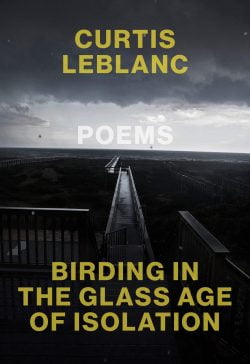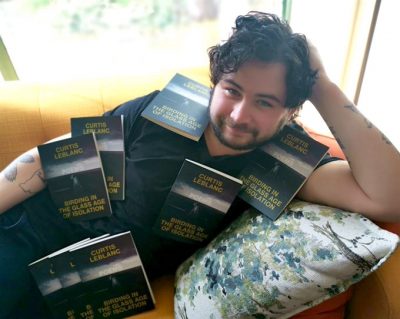#814 Anxiety and clunky plastics
INTERVIEW: Curtis LeBlanc with Nathaniel G. Moore
*
 Curtis LeBlanc’s second poetry book is fresh off the printing press and on bookshelves across the country, in the middle of a global pandemic. Birding In The Glass Age of Isolation (Gibsons: Nightwood Editions, April 2020) confronts mental illness, masculinity, and humanity’s relationship with the nature world. Birding In The Glass Age of Isolation is also featured in a recent review by Chris Banks in The Miramachi Reader — Nathaniel G. Moore.
Curtis LeBlanc’s second poetry book is fresh off the printing press and on bookshelves across the country, in the middle of a global pandemic. Birding In The Glass Age of Isolation (Gibsons: Nightwood Editions, April 2020) confronts mental illness, masculinity, and humanity’s relationship with the nature world. Birding In The Glass Age of Isolation is also featured in a recent review by Chris Banks in The Miramachi Reader — Nathaniel G. Moore.
*
Nathaniel Moore: Your first poetry book, Little Wild, was released in 2018. Since you completed that book and began Birding… how did your approach differ?
Curtis LeBlanc: My first book was the amalgamation of the usable poems I wrote during my MFA and the end of my BFA. I was trying to find my voice and trying out lots of little experiments and just kind of throwing it out there to see what would stick. This second collection was more deliberate in the sense that I was a little more selective in the ideas I would pursue. I knew what I wanted the themes to be and tried to write poems that would fit, however loosely or perfectly.

Nathaniel Moore: In a previous interview with Rob Taylor, you said “I think I’ve always been interested in characters who are at odds with the world around them, struggling with how people expect them to be.” How has this changed or remained true with Birding?
Curtis LeBlanc: I think this theme is present still in Birding. I’m still really interested in conversations surrounding masculinity and the performance of it. I think this is especially present in the title poem, or in a poem like “Design Stage Failure Analysis.” I can’t really see this conversation ever becoming completely absent from my work, it being so true to the life I live and the person I try to be.
Nathaniel Moore: What is it like living with and being married to another writer?
Curtis LeBlanc: Being with Mallory [Tater] is a blessing. She’s my best friend. We laugh constantly. We’re complete goofs behind closed doors—and sometimes in public, too. We’re also both really emotional people and lean on each other heavily when we need to. Home is a place of great comfort for both of us. In terms of writing, I trust her more than anyone as a first reader and editor. She’s not afraid to tell me when something isn’t working, even if she can’t say how to fix it. I try to be that for her as well.
Nathaniel Moore: “A Restaurant in California” to me is a great lyric poem. It reminded me at first, mainly because of the title, of Allen Ginsberg’s “A Supermarket in California.” Was there any intention there to pay homage? It seems that its not impossible you and Ginsberg’s paths may not have crossed at the library. A slim chance let’s say.
Curtis LeBlanc: Nobody has ever pointed that out to me before and I can’t say I did it deliberately, but subconsciously that’s probably why I titled it that way. I know the Ginsberg poem, of course. I think I first read it in English 11.
Nathaniel Moore: In “Unforgiving Air…” you unpackage memory, and like an alchemic tableau, blend the physical, the inanimate, the natural with the human beings who haunt the piece. The poem describes a type of possession that hovers over those who live in its past. What inspired this piece, and what was the process of its creation?
Curtis LeBlanc:When I graduated from high school, my friends and I went to spend a couple of weeks at a friend’s family farm in Arundel, Quebec. It’s a small Anglophone community not far from Mont Tremblant and the area is just gorgeous: rolling green hills, idyllic rivers and small waterfalls along the side of the road, that sort of thing. The poem kind of unfolded like a montage of memories from that trip — walking the golf course after midnight, seeing fireflies and buying scratch cards for the first time. We really did catch those fish by hand and let them go again from a big smooth rock in the middle of the lake. It’s one of the poems in the book that unravelled over the course of months. Every now and then another memory would come to me, and if I thought it could fit, I’d work it into the structure of the poem.

Nathaniel Moore: Your poetry is at conflict with the modern world and its clunky plastics, its interfering structures and that of the organic, natural world. Is that a fair appraisal?
Curtis LeBlanc: I’d say that’s pretty fair. I’ve always been interested in the ways that the artificial world infringes on the natural one and how that line is blurred as we as a species move along through time. In the same way that those clunky plastics are sometimes cast as the villain in some of my work, I’d say the natural world is equally represented as a refuge, a sanctuary of sorts. I really do find a lot of peace in nature personally — but that doesn’t mean I’m always proactive about seeking it out. This, I think, is another source of conflict in both my life and my poems.
Nathaniel Moore: How have you been coping with the release of your book in this historic time?
Curtis LeBlanc: It’s been interesting for sure. I keep telling my wife it’s hard to feel bad about anything when so many lives are being impacted in the worst possible way. The book coming out right now—it is what it is. I feel extra motivated to spread the word in digital spaces. So many people in the community are stepping up right now with opportunities to promote poetry and writing, and to them I’m incredibly grateful.
*
Curtis LeBlanc was shortlisted for the Walrus Poetry Prize in 2016, received the Readers’ Choice Award in Arc’s Poem of the Year Contest, and was shortlisted for CV2’s Young Buck Poetry Prize. His writing has appeared in The Malahat Review, Eighteen Bridges, Prairie Fire, EVENT, Geist, Arc, NewPoetry.ca, and The City Series: Edmonton Anthology, from Frog Hollow Press. He’s Managing Editor of Rahila’s Ghost Press, co-host of Tonic Reading Series, Web Editor at Nineteen Questions, and an occasional hockey columnist for NHL Numbers. He served as Executive Editor of Promotions at PRISM international in 2016-2017. His poetry chapbook Good for Nothing was published by Anstruther Press in 2017. LeBlanc lives in Vancouver.
*
Nathaniel G. Moore is the author of seven books including Savage 1986-2011 (Anvil Press), winner of the 2014 Relit Award for Best Novel. His book reviews have appeared in the Georgia Straight, the Globe and Mail, and Canadian Literature, and he reviewed Scarred, by Sarah Edmondson, for The Ormsby Review (no. 706, December 21, 2019). He has also interviewed Tom Wayman for The Ormsby Review (no. 789, April 3, 2020). Formerly of Pender Harbour, Nathaniel now lives and works in in Fredericton, New Brunswick.
*
The Ormsby Review. More Books. More Reviews. More Often.
Publisher and Editor: Richard Mackie
The Ormsby Review is a journal service for in-depth coverage of B.C. books and authors. The Advisory Board consists of Jean Barman, Robin Fisher, Cole Harris, Wade Davis, Hugh Johnston, Patricia Roy, David Stouck, and Graeme Wynn. Scholarly Patron: SFU Graduate Liberal Studies. Honorary Patron: Yosef Wosk. Provincial Government Patron since September 2018: Creative BC
“Only connect.” – E.M. Forster